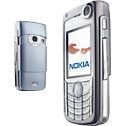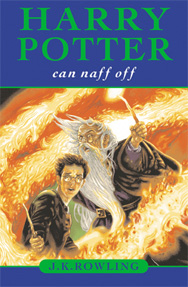 My new phone arrived on Friday, and I’ve been playing about with it some over the weekend. It’s a replacement for the Motorola v525 I got at the beginning of last year, and I’m really struggling to think why it has taken me this long to change it. Although my initial impression of the v525 was favourable, long term use was proving dangerous to my sanity and temper. “Possessed by the Devil” and “loathesome piece of shit” are some of the nicer things I’ve had to say about it over the last year and a half.
My new phone arrived on Friday, and I’ve been playing about with it some over the weekend. It’s a replacement for the Motorola v525 I got at the beginning of last year, and I’m really struggling to think why it has taken me this long to change it. Although my initial impression of the v525 was favourable, long term use was proving dangerous to my sanity and temper. “Possessed by the Devil” and “loathesome piece of shit” are some of the nicer things I’ve had to say about it over the last year and a half.
My main criteria for this new phone were:
- It had to be a Nokia. After that experience with a Motorola phone, I was in desperate need of some Finnish lovin’.
- It had to have a decent camera on it.
- It had to do email nicely. Sending a photo in an email should be utterly painless. Reading email likewise.
- A decent mobile web browser: i.e. Opera pre-installed, or the ability to run it.
- Did I mention it had to be a Nokia?
After a bit of research, I narrowed the choice down to a few models. And after a bit more research, I decided it would be fun to get something top-of-the range, instead of the more basic models I usually pick. The Nokia 6680 is a 3G phone with video capabilities, a 1.3 Megapixel camera and a lower-res front-facing camera, a gorgeous high-colour screen, and it runs Symbian OS, so there are a large number of third-party applications I can install on it.
My initial impression of the phone after using some of the basic features (making and receiving calls, adding contacts, taking and storing pictures, and browsing through them afterwards) was blessed relief. The user interface for doing all of these things was simple, comfortable, and intuitive.
Unfortunately, neither the phone’s manual, nor the Nokia PC Suite software for connecting the phone to a PC were up to the same standard. Despite being able to make use of a full qwerty keyboard, using the software to add a new contact on the PC is not noticeably faster than entering one on the phone. (Really!) Also, Vodafone has customized the crap out of the default Nokia interface, so icons and applications aren’t where the manual says they should be. Yet even without this shuffling and shoogling, the manual would still fit Joel Spolsky’s guidelines for uselessness in technical writing:
When you don’t have a spec, what happens with the poor technical writers is the funniest (in a sad kind of way). Tech writers often don’t have the political clout to interrupt programmers. In many companies, if tech writers get in the habit of interrupting programmers to ask how something is supposed to work, the programmers go to their managers and cry about how they can’t get any work done because of these [expletive deleted] writers, and could they please keep them away, and the managers, trying to improve productivity, forbid the tech writers to waste any more of their precious programmers’ time. You can always tell these companies, because the help files and the manuals don’t give you any more information than you can figure out from the screen. When you see a message on a screen which says
- Would you like to enable LRF-1914 support?
… and you click “Help”, a tragicomic help topic comes up which says something like
- Allows you to choose between LRF-1914 support (default) or no LRF-1914 support. If you want LRF-1914 support, choose “Yes” or press “Y”. If you don’t want LRF-1914 support, choose “No” or press “N”.
Um, thanks. It’s pretty obvious here that the technical writer was trying to cover up the fact that they didn’t know what LRF-1914 support is. They couldn’t ask the programmer, because (a) they’re embarrassed, or (b) the programmer is in Hyderabad and they’re in London, or (c) they have been prohibited by management from interrupting the programmer, or any other number of corporate pathologies too numerous to mention, but the fundamental problem is that there wasn’t a spec.
Vodafone’s web site offers no more help, with the result that after two days of mucking about, I still don’t know what the difference is between connecting to the internet with an “Internet” and a “WAP” connection. Is one faster than the other? More expensive? Who knows. I’ll probably head into the Vodafone shop on Princes St tomorrow and ask a real person.
Which brings me round to the final part of the story: actually buying the phone. I went into the Vodafone shop last week, and told the guy there that I wanted to buy a Nokia 6680. He plugged my details into his terminal, and came up with a price of £250. Pretty steep.
“But wait,” he said. “If you call up the Vodafone Business customer service number, they’ll probably be able to quote you a better price.”
And sure enough, when I called Vodafone directly, I got offered exactly the same phone for just £100. No haggling or complaining needed.
To which I say: great! But also: huh? This was a Vodafone shop I went to, not a generic mobile phone store that supplies contracts and phones for all the different networks. And their high street price was two-and-a-half times more expensive than their phone in price? Are they plugged in to the same back-end systems, or what?
 Listening to
Listening to 
 My new phone arrived on Friday, and I’ve been playing about with it some over the weekend. It’s a replacement for the Motorola v525 I got at the beginning of last year, and I’m really struggling to think why it has taken me this long to change it. Although
My new phone arrived on Friday, and I’ve been playing about with it some over the weekend. It’s a replacement for the Motorola v525 I got at the beginning of last year, and I’m really struggling to think why it has taken me this long to change it. Although